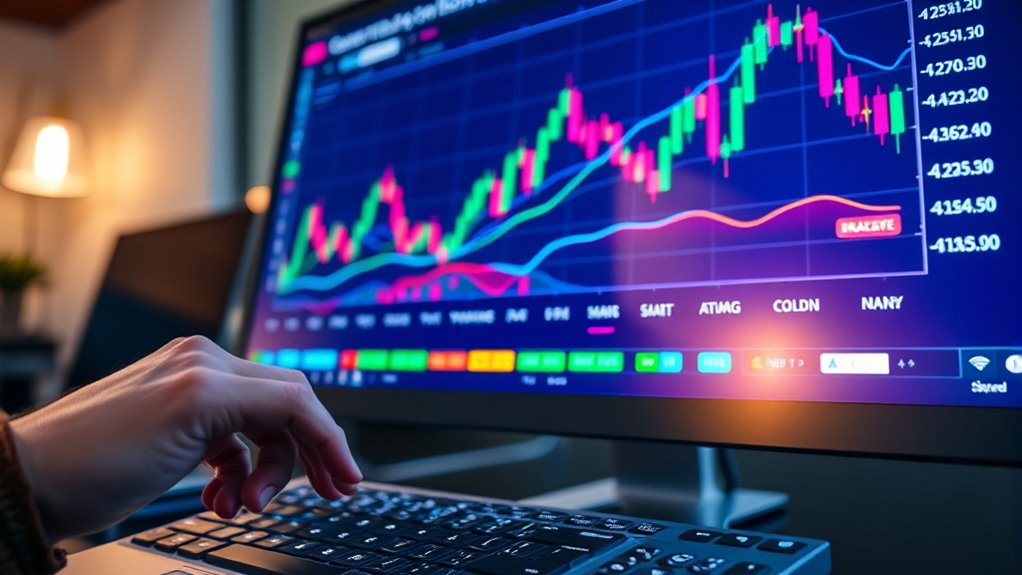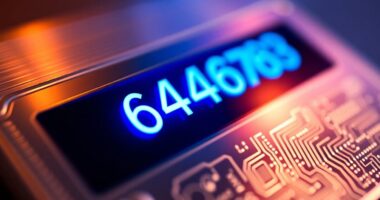To exchange cryptocurrencies on a DEX, start by connecting your wallet, like MetaMask, to the platform. Choose the tokens you want to swap and enter the amount you wish to exchange. Review the estimated rate based on current liquidity pools, then confirm the trade. The transaction is executed automatically with smart contracts. Since you control your assets directly, guarantee your wallet’s security, and explore more for tips on safe and efficient trading.
Key Takeaways
- Connect your crypto wallet (like MetaMask) to the DEX platform before trading.
- Select the tokens you want to swap and enter the amount to trade.
- Review the estimated exchange rate and transaction details based on liquidity pool data.
- Confirm the trade to execute it automatically through the smart contract.
- Ensure your assets are transferred securely to your wallet and monitor network fees and delays.

Decentralized exchanges (DEXs) are transforming how you trade cryptocurrencies by eliminating intermediaries and giving you direct control over your assets. Instead of relying on a centralized platform, you connect your wallet directly to the DEX, allowing for peer-to-peer transactions. This setup offers greater privacy and reduces the risk of censorship or platform failure. When you want to exchange tokens, you typically use liquidity pools—collections of funds provided by other users—rather than traditional order books. These pools are the backbone of many DEXs, enabling automatic trading through smart contracts. By adding your assets to a liquidity pool, you contribute to its liquidity, which helps facilitate smoother and faster trades. In return, you often earn a share of the trading fees proportional to your contribution. This process is transparent and permissionless, meaning anyone can participate without needing approval. Additionally, understanding the importance of smart contract security is vital, as vulnerabilities can lead to significant losses if not properly vetted.
However, to guarantee your assets are safe when using a DEX, you need to pay attention to smart contract security. Smart contracts are self-executing code that governs the trading process, and their security is vital because vulnerabilities can lead to loss of funds. Before engaging in a trade, verify that the smart contracts powering the exchange have undergone thorough audits and have a good reputation within the community. Many security breaches happen due to flaws in the contract code, so choosing well-audited platforms minimizes risk. Once you’re comfortable with the smart contract’s security, connecting your wallet is straightforward. You’ll need a compatible crypto wallet, like MetaMask, to interact with the DEX’s interface. After connecting your wallet, select the tokens you wish to swap and specify the amount. The DEX will then display an estimated rate based on current liquidity pool conditions.
When you initiate the trade, the smart contract executes it automatically, adjusting the liquidity pools accordingly. Because these pools are dynamic, prices can fluctuate during the transaction, so reviewing the estimated rate before confirming is wise. Keep in mind that the process is generally quick, but network congestion can cause delays or higher gas fees. After confirming your trade, your new tokens are transferred directly to your wallet, giving you full control over your assets. Remember, unlike centralized exchanges, DEXs don’t hold your funds, so you’re responsible for managing your private keys securely. By understanding liquidity pools and prioritizing smart contract security, you can confidently navigate the process of exchanging cryptocurrencies on a DEX, enjoying a decentralized, transparent, and potentially more secure trading experience.
Frequently Asked Questions
Are DEXS Safer Than Centralized Exchanges?
Decentralized exchanges are generally safer than centralized ones because they reduce the risk of hacking and protect your user anonymity. However, they face regulatory challenges that can impact their operation and user security. While DEXs give you more control over your funds and privacy, you must still exercise caution and understand the risks involved. Overall, they offer a safer environment for those valuing privacy and control over their assets.
How Do Gas Fees Affect DEX Transactions?
Gas fees directly impact your DEX transactions by affecting both cost and transaction speed. Higher gas fees can speed up your transaction due to priority miners, while lower fees might slow it down or cause delays. To save money, you can try gas optimization strategies, like transacting during off-peak times. Keep an eye on current network congestion, so you balance transaction speed and costs effectively.
Can I Reverse a DEX Trade if I Make a Mistake?
It’s unfortunate, but DEX trades are typically irreversible once confirmed. You can’t usually reverse a trade or cancel it afterward, even if you make a mistake. This means you need to double-check all details before confirming a swap. Always review the transaction carefully, as reversible trades and trade cancellations aren’t standard features on decentralized exchanges. Be cautious, and verify everything’s correct before you hit “confirm” to avoid costly errors.
What Tokens Are Compatible With Specific DEXS?
You need to check the token compatibility of a specific DEX before trading. Most DEXs support popular tokens like ERC-20, BEP-20, or other standards, but compatibility varies. To choose the right DEX, consider its supported tokens, blockchain network, and liquidity. Always verify token compatibility and network support on the DEX’s official site or documentation to guarantee smooth trading and avoid issues.
How Do I Ensure the Security of My Wallet During Swaps?
They say, “Better safe than sorry,” and that’s true for crypto swaps. To guarantee your wallet’s security, always back it up before trading, so you don’t lose access. Use strong, unique passwords and enable two-factor authentication if available. Be cautious of phishing attempts—double-check URLs and avoid clicking suspicious links. These steps help protect your assets during swaps and keep your crypto safe.
Conclusion
Now that you know how to exchange cryptocurrencies on DEXs, you’re ready to explore the decentralized world confidently. Imagine swapping your ETH for a new DeFi token to earn passive income—like Lisa, who did it and doubled her holdings in months. DEXs give you control and flexibility, so plunge in, do your research, and start trading securely. The crypto future is yours to shape—just keep learning and stay cautious!









